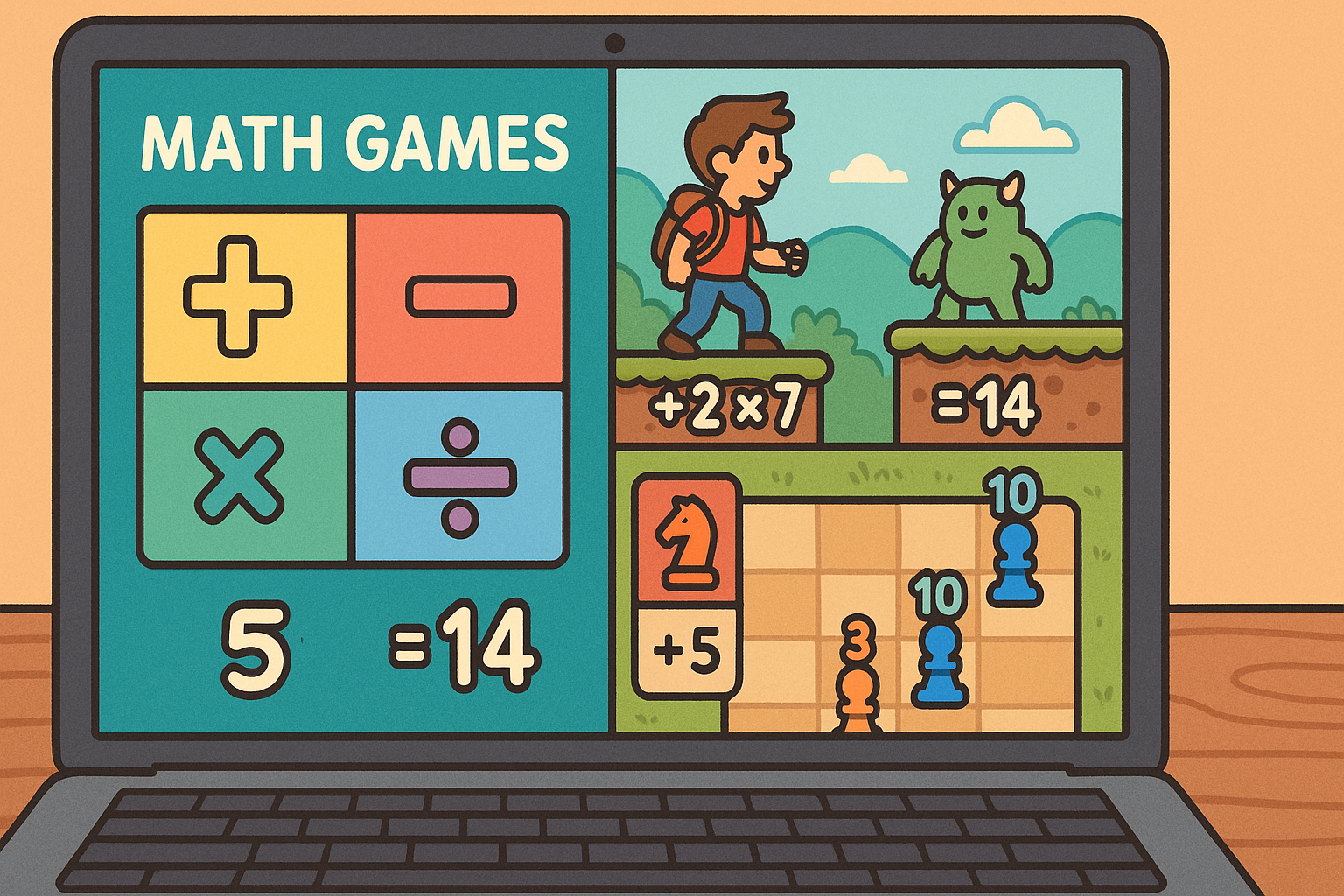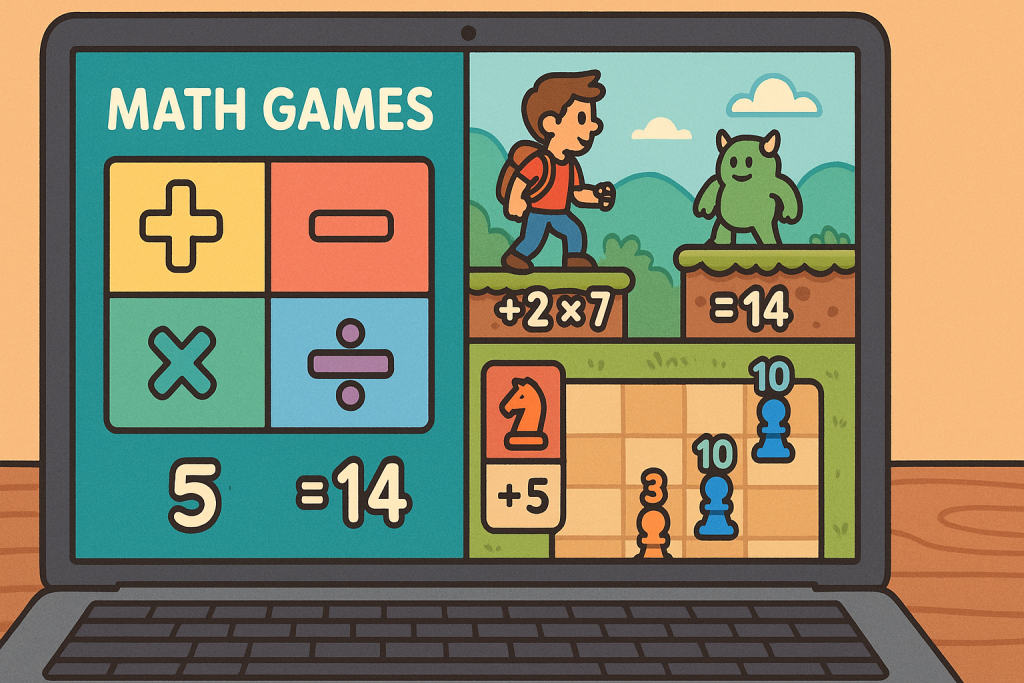Mathematical language is universal: it is spoken worldwide, and hardly do people imagine that numbers, shapes, and equations could also be a source of pure fun. Yet, the right approach may determine the perception of the subject and convey even the most sophisticated information in a more simplified, perceptible way.
Math games online offer a new, interactive perspective that makes abstract concepts more solid and easy to approach. Even the youngest players may take the most out of this experience and finally see math as an exciting challenge rather than an obligation to feel. So, what may math games offer, and how do they usually work?

What Are Math Games, and How Do They Work?
First comes the notion. Math games are interactive (usually digital) tools that contain and deliver puzzles, challenges, simple tasks, or any other activities associated with math. When compared to traditional drills, they rely on engaging formats that are meant to entertain and make the process of solving less stressful, but enjoyable in turn.
The way they work is simple: each game revolves around math concepts (e.g., addition, fractions, geometry, or any other aspect of math), which are integrated into the mechanics. To progress, players must solve problems, spot patterns, or calculate outcomes to unlock the next stage and move on. This is how a casual task does not feel like a chore.
Why the Gamified Approach Is So Beneficial
Gamification is a blessing, for it can turn any task into an adventure, which is positively perceived by people engaged. Instead of facing dry equations on paper, learners interact with challenges, rewards, and levels that keep them motivated all the time.
Here are some of the main benefits of gamified math learning in action:
- Motivation through rewards: Points, badges, or unlocked levels keep learners engaged (though it is a controversial take).
- Immediate feedback: Players see results right away, which helps them correct mistakes on the spot.
- Adaptability: Many games adjust to a player’s skill level, which makes learning personalized.
- Confidence building: Success in small steps encourages persistence and reduces math anxiety in general.
- Skill development: Games typically affect the mindset, cognitive patterns, logical thinking, memory, problem-solving, and more.
Types of Math Games Online
Math games are different: they come in various forms and refer to diverse learning styles, ages, and skill levels as well. Nonetheless, the corpus of these activities can be divided into a few major categories:
- Puzzle and Logic Games
These are the games that engage players in pattern identification, riddle cracking, and strategy planning. Sudoku, tangram apps, and logic mazes are all excellent examples of activities that improve reasoning and mathematical fluency simultaneously.
- Skill-Drill Games
The second group refers to the games, which are generally fast-paced and time-based and do focus on fundamental concepts such as addition, subtraction, multiplication, and fractions. They are ideal for young students who need to learn the material more profoundly, yet in a fun and encouraging manner.
- Strategy and Simulation Games
Here, math is strongly connected with decision-making. To be more precise, players might manage resources, calculate probabilities, or plan moves ahead so as to use these skills further in real-world problems.
- Adventure and Story-Based Games
Arithmetic practice may be more entertaining, especially when converted into an intriguing journey. In this case, players need to solve equations or complete numerical challenges to advance across levels, unlock new characters, and explore virtual worlds.
- Competitive and Multiplayer Games
Some systems offer challenges for groups rather than solo players. Here, learners need friends to compete against other players, plan together, and make sound decisions unanimously, trusting each other’s reasoning.

Featured Games You’ll Love
The world of online math games is full of variety (just like any domain, influenced by games). There is always something you may like – you only need some time to try different options and choose which one suits your needs best.
| Game | Main Focus | Skills Trained | Why You May Love It |
| Mind Elevate | Multi-domain brain training | Memory retention, attention, logical reasoning, math fluency, musical perception | Offers math and cognitive challenges in a playful, interactive style (Moon Lift game is a must!) |
| Prodigy Math | Curriculum-aligned math adventure | Arithmetic, problem-solving, decision-making | Gameplay that turns math practice into an epic quest with stories to tell. |
| Coolmath Games | Wide range of puzzles and number-based challenges | Logical reasoning, strategy, spatial awareness | A diverse collection, which is perfect for quick play or deep focus sessions, too. |
| Math Blaster | Action-based math missions | Basic operations, speed, accuracy | An arcade-style game that keeps kids practicing without realizing that it is work. |
| Lumosity (Math Set) | Brain training exercises with numerical focus | Memory, attention, problem-solving, mental flexibility | Combines science-supported brain workouts with fun game mechanics. |
| KenKen Online | Puzzle-based math logic game | Logic, arithmetic, pattern recognition | Similar to Sudoku but with an extra mathematical twist. |
| Sumaze! | Maze puzzles built on math principles | Algebra, fractions, powers, logical reasoning | A challenging yet rewarding option for older students and math lovers. |
| Refraction | Puzzle game with fractions and problem-solving | Fractions, division, critical thinking | Teaches tricky concepts like fractions in a highly visual and interactive way. |
Tips for Making the Most of Math Games
- Set balanced playtime: Short, regular sessions (15–30 minutes) are more effective than long, exhausting marathons.
- Mix online with offline practice: Explore game concepts and try to apply them in your daily life (e.g., budgeting may benefit from it for sure).
- Encourage friendly competition: Playing with friends or family to make this experience more exciting. Besides, teamwork may promote communication and strategic thinking, which are vital every day.
- Track progress: Many games offer progress reports or achievement tracking. Review these to highlight areas of strength and topics that need more practice.
- Match games to skill level: Choose games that are challenging but achievable. Games that are too easy feel boring, while activities that are too hard are usually useless in terms of progress.
- Celebrate small wins: A win is a win, no matter how small it may be. Celebrate each achievement to build confidence and reduce math anxiety after all.
- Set clear goals: Decide what you want to focus on and choose games that support that goal. Focusing on all at once is not reasonable indeed.
- Combine different types of games: Mix logic puzzles, skill drills, adventure-based, and strategy games to strengthen a wider range of skills.
Stay curious and experiment – this is your way to prosper!






